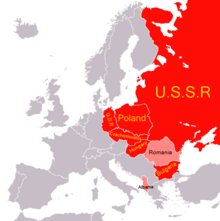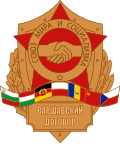
Back التخلص من التبعية الستالينية في رومانيا الاشتراكية Arabic Retirada do status de "Estado satélite" da Romênia Portuguese اشتراکی رومانیا کی بے تابعہ کاری Urdu

| Eastern Bloc |
|---|
 |
The de-satellization of the Socialist Republic of Romania from the Soviet Union was the release of Romania from its Soviet satellite status in the 1960s. The Romanian leadership achieved the de-satellization partly by taking advantage of Nikita Khrushchev's errors and vulnerabilities.[1] Romania's independence was tolerated by Moscow because its ruling party was not going to abandon communism.[2] Although Romania remained a member of both the Warsaw Pact and Comecon, it was not to be a docile member of either.[3]: 189
Even before Nicolae Ceaușescu came to power, Romania was a genuinely independent country, as opposed to the rest of the Warsaw Pact. To some extent, it was even more independent than Cuba (a socialist state that was not a member of the Warsaw Pact).[4] The Romanian regime was largely impervious to Soviet political influence, and Ceaușescu was the only declared opponent of glasnost and perestroika. Due to the conflictual relationship between Bucharest and Moscow, the West did not hold the Soviet Union responsible for the policies pursued by Romania, as it did for other countries in the region such as Czechoslovakia and Poland.[5] At the start of 1990, Soviet foreign minister Eduard Shevardnadze implicitly confirmed the lack of Soviet influence over Ceaușescu's Romania. When asked whether it made sense for him to visit Romania less than two weeks after its revolution, Shevardnadze insisted that only by going in person to Romania could he figure out how to "restore Soviet influence".[6]
Romania's independence left little room for the independence of others, and as such had to be isolated. In the late 1960s, Władysław Gomułka of Poland and Todor Zhivkov of Bulgaria even suggested expelling Romania from the Warsaw Pact over Romanian-proposed amendments to the Treaty on the Non-Proliferation of Nuclear Weapons. The ensuing declaration of support for the Soviet draft of the non-proliferation treaty - signed without Romania - made public for the first time the disagreements between Romania and the rest of the Warsaw Pact members. The Prague Spring enabled Romania to turn its isolation back into independence. Ceaușescu's Romania had at least as much leverage within the Warsaw Pact as Charles de Gaulle's France had within NATO. However, instead of withdrawing Romania from the Warsaw Pact as de Gaulle did with the integrated structures of NATO, the Romanian leadership began to see the benefits of the Pact as an instrument for asserting its independence.[7]
By the time Soviet Marshal Andrei Grechko assumed command of the Warsaw Pact in 1960, both Romania and Albania had for all practical purposes defected from the Pact. In the early 1960s, Grechko initiated programs meant to preempt Romanian doctrinal heresies, which threatened the Pact's unity and cohesion, from spreading to other Pact members. No other country succeeded in escaping from the Warsaw Pact in the way Romania and Albania did. Yet while Albania formally withdrew from the Pact in 1968, Romania did not. Its reasons for remaining included Ceaușescu's interest in preserving the threat of a Pact invasion so he could sell himself as a nationalist, as well as privileged access to NATO counterparts and a seat at various European forums which he otherwise could not have obtained.[8] For instance, Romania and the Soviet-led remainder of the Warsaw Pact formed two distinct groups in the elaboration of the Helsinki Final Act.[9]
Certain historians such as Robert King and Dennis Deletant argue against using the term "independent" to describe Romania's relations with the Soviet Union, favoring "autonomy" due to its continued membership in both the Comecon and Warsaw Pact, along with its commitment to socialism. But this perspective fails to explain why Romania blocked Mongolia's accession to the Warsaw Pact in July 1963, why it voted in favor of a November 1963 UN resolution to establish a nuclear-free zone in Latin America when the other Socialist countries abstained, or why it opposed the Soviet-proposed "strong collective riposte" against China in 1964, to take but a few examples from the 1963–1964 period.[10]
- ^ Rothschild, Joseph; Wingfield, Nancy Meriwether (2008). Return to Diversity: A Political History of East Central Europe Since World War II. Oxford University Press. p. 196. ISBN 978-0-19-533474-6.
- ^ Cook, Bernard A. (2001). Europe Since 1945: An Encyclopedia. Vol. 2. Taylor & Francis. p. 1075. ISBN 978-0-8153-4058-4.
- ^ R. J. Crampton (15 July 2014). The Balkans Since the Second World War. Routledge. doi:10.4324/9781315843209. ISBN 9781317891178.
- ^ Tismaneanu, Vladimir; Stan, Marius (17 May 2018). Romania Confronts Its Communist Past: Democracy, Memory, and Moral Justice. Cambridge University Press. p. 132. ISBN 978-1-107-02592-9.
- ^ Lévesque, Jacques (28 May 2021). The Enigma of 1989: The USSR and the Liberation of Eastern Europe. University of California Press. pp. 192–193. ISBN 978-0-520-36498-1.
- ^ Service, Robert (8 October 2015). The End of the Cold War: 1985 - 1991. Pan Macmillan. p. 429. ISBN 978-1-4472-8728-5.
- ^ Crump, Laurien (11 February 2015). The Warsaw Pact Reconsidered: International Relations in Eastern Europe, 1955-1969. Routledge. pp. 200 and 202-204. doi:10.4324/9781315732541. ISBN 978-1-317-55530-8.
- ^ Goldman, Emily O.; Eliason, Leslie C. (2003). The Diffusion of Military Technology and Ideas. Stanford University Press. pp. 140 and 142-143. ISBN 978-0-8047-4535-2.
- ^ Ben-Dor, Gabriel; Dewitt, David Brian (1987). Conflict Management in the Middle East. Lexington Books. p. 242. ISBN 978-0-669-14173-3.
- ^ Dragomir, Elena (12 January 2015). Cold War Perceptions: Romania's Policy Change towards the Soviet Union, 1960-1964. Cambridge Scholars Publishing. p. 14. ISBN 978-1-4438-7303-1.
© MMXXIII Rich X Search. We shall prevail. All rights reserved. Rich X Search